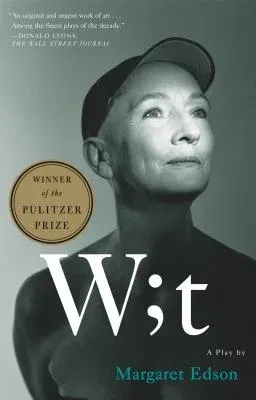**Winner of the 1999 Pulitzer Prize for Drama, the New York Drama
Critics Circle Award, the Drama Desk Award, the Outer Critics Circle
Award, the Lucille Lortel Award, and the Oppenheimer Award.
Adapted to an Emmy Award-winning television movie, directed by Mike
Nichols, starring Emma Thompson.
**
Margaret Edson's powerfully imagined Pulitzer Prize-winning play
examines what makes life worth living through her exploration of one of
existence's unifying experiences--mortality--while she also probes the
vital importance of human relationships. What we as her audience take
away from this remarkable drama is a keener sense that, while death is
real and unavoidable, our lives are ours to cherish or throw away--a
lesson that can be both uplifting and redemptive. As the playwright
herself puts it, The play is not about doctors or even about cancer.
It's about kindness, but it shows arrogance. It's about compassion, but
it shows insensitivity.
In Wit, Edson delves into timeless questions with no final answers:
How should we live our lives knowing that we will die? Is the way we
live our lives and interact with others more important than what we
achieve materially, professionally, or intellectually? How does language
figure into our lives? Can science and art help us conquer death, or our
fear of it? What will seem most important to each of us about life as
that life comes to an end?
The immediacy of the presentation, and the clarity and elegance of
Edson's writing, make this sophisticated, multilayered play accessible
to almost any interested reader.
As the play begins, Vivian Bearing, a renowned professor of English who
has spent years studying and teaching the intricate, difficult Holy
Sonnets of the seventeenth-century poet John Donne, is diagnosed with
advanced ovarian cancer. Confident of her ability to stay in control of
events, she brings to her illness the same intensely rational and
painstakingly methodical approach that has guided her stellar academic
career. But as her disease and its excruciatingly painful treatment
inexorably progress, she begins to question the single-minded values and
standards that have always directed her, finally coming to understand
the aspects of life that make it truly worth living.

